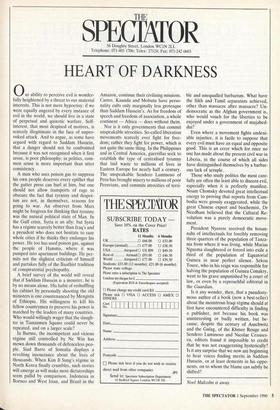SPECTAT THE OR
56 Doughty Street, London WC1N 2LL
Telephone: 071-405 1706; Telex: 27124; Fax: 071-242 0603
HEART OF DARKNESS
0 ur ability to perceive evil is wonder- fully heightened by a threat to our material interests. This is not mere hypocrisy: if we were equally angered by every instance of evil in the world, we should live in a state of perpetual and quixotic warfare. Self- interest, that most despised of motives, is scarcely illegitimate in the face of unpro- voked attack. And to argue, as some have argued with regard to Saddam Hussein, that a danger should not be confronted because it was not recognised when it first arose, is poor philosophy: in politics, com- mon sense is more important than utter consistency.
A man who uses poison gas to suppress his own people deserves every epithet that the gutter press can hurl at him, but one should not allow transports of rage to obscure the fact that tyranny and despot- ism are not, in themselves, reasons for going to war. An observer from Mars might be forgiven for thinking that tyranny was the natural political state of Man. In the Gulf crisis, Syria is an ally: but Syria has a regime scarcely better than Iraq's and a president who does not hesitate to raze whole cities if he thinks they endanger his power. He too has used poison gas, against the people of Hamma, where it was pumped into apartment buildings. He per- mits not the slightest criticism of himself and partakes fully of the Baathist tradition of conspiratorial psychopathy.
A brief survey of the world will reveal that if Saddam Hussein is a monster, he is by no means alone. His habit of reshuffling his cabinet by personally shooting the old ministers is one countenanced by Mengistu of Ethiopia. His willingness to kill his fellow countrymen to preserve his power is matched by the leaders of many countries. Who would willingly wager that the slaugh- ter in Tiananmen Square could never be repeated, and on a larger scale?
In Burma, the incompetent and vicious regime still controlled by Ne Win has mown down thousands of defenceless peo- ple. Siad Barre of Somalia displays a revolting insouciance about the lives of thousands. When Kim 11 Sung's regime in North Korea finally crumbles, such stories will emerge as will make most dictatorships seem pallid by comparison. Indonesia in Borneo and West Irian, and Biazil in the Amazon, continue their civilising missions. Castro, Kaunda and Mobutu have perso- nality cults only marginally less grotesque than Saddam Hussein's. As for freedom of speech and freedom of association, a whole continent — Africa — does without them.
Nor is it only governments that commit unspeakable atrocities. So-called liberation movements scarcely ever fight for free- dom; rather they fight for power, which is not quite the same thing. In the Philippines and in Central America, guerrillas seek to establish the type of centralised tyranny that laid waste to millions of lives in Eastern Europe for nearly half a century. The unspeakable Sendero Luminoso of Peru has brought misery to millions of poor Peruvians, and commits atrocities of terri- ble and unequalled barbarism. What have the Sikh and Tamil separatists achieved, other than massacre after massacre? Un- democratic as the Afghan government is, who would vouch for the liberties to be enjoyed under a government of mujahed- din?
Even where a movement fights undeni- able injustice, it is facile to suppose that every evil must have an equal and opposite good. This is an error which for once no one has made about the present civil war in Liberia, in the course of which all sides have distinguished themselves by a barbar- ous lack of scruple. Those who study politics the most care- fully are often the least able to discern evil, especially when it is perfectly manifest.
Noam Chomsky devoted great intellectual energy to proving that reports from Cam- bodia were grossly exaggerated, while the great Chinese expert and biochemist, Dr Needham believed that the Cultural Re- volution was a purely democratic move- ment.
President Nyerere received the hosan- nahs of intellectuals for forcibly removing three quarters of the population of Tanza- nia from where it was living, while Macias Nguema slaughtered or forced into exile a third of the population of Equatorial Guinea in near perfect silence. Sekou Toure, who in his reign was responsible for halving the population of Guinea Conakry, went to his grave unpunished by a court of law, or even by a reproachful editorial in the Guardian.
Is it any wonder, then, that a pseudony- mous author of a book (now a best-seller) about the monstrous Iraqi regime should at first have encountered difficulty in finding a publisher, not because his, book was uninteresting or badly written, but be- cause, despite the century of Auschwitz and the Gulag, of the Khmer Rouge and Sendero Luminoso and Nicolae Ceauses- cu, editors found it impossible to credit that he was not exaggerating hysterically?
Is it any surprise that we now are beginning to hear voices finding merits in Saddam Hussein, or at least demerits in his oppo- nents, on to whom the blame can subtly be shifted?


















































 Previous page
Previous page